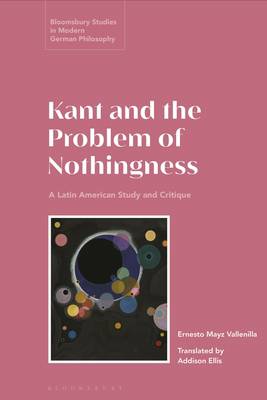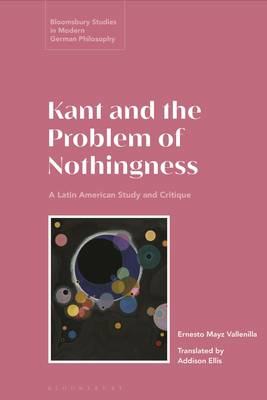
Bedankt voor het vertrouwen het afgelopen jaar! Om jou te bedanken bieden we GRATIS verzending (in België) aan op alles gedurende de hele maand januari.
- Afhalen na 1 uur in een winkel met voorraad
- In januari gratis thuislevering in België
- Ruim aanbod met 7 miljoen producten
Bedankt voor het vertrouwen het afgelopen jaar! Om jou te bedanken bieden we GRATIS verzending (in België) aan op alles gedurende de hele maand januari.
- Afhalen na 1 uur in een winkel met voorraad
- In januari gratis thuislevering in België
- Ruim aanbod met 7 miljoen producten
Zoeken
€ 195,45
+ 390 punten
Omschrijving
The Latin American philosopher Ernesto Mayz Vallenilla published the first study of Kant's concept of nothingness in 1965. This translation of Mayz Vallenilla's ground-breaking work makes it available in English for the first time.
Mayz Vallenilla's interpretation is deeply informed by Heidegger's reading of Kant, against the background of the early 20th century neo-Kantian tradition. He offers a detailed interpretation and critique of "nothing" as it appears in the Amphiboly chapter of the Critique of Pure Reason and presents an analysis of Kant's Table of Nothing which understands temporality as the horizon of all possible cognition[AE1], including cognition of real nothings.
Accompanied by translator's notes and a glossary, Addison Ellis' translation includes extensive commentary and an introduction providing historical context and references to the original sources in German. He preserves key terminology and phrasing from the original text and allows an often-neglected connection to be made between the Kantian tradition in Latin America and the tradition in the Anglophone world.
Mayz Vallenilla's interpretation is deeply informed by Heidegger's reading of Kant, against the background of the early 20th century neo-Kantian tradition. He offers a detailed interpretation and critique of "nothing" as it appears in the Amphiboly chapter of the Critique of Pure Reason and presents an analysis of Kant's Table of Nothing which understands temporality as the horizon of all possible cognition[AE1], including cognition of real nothings.
Accompanied by translator's notes and a glossary, Addison Ellis' translation includes extensive commentary and an introduction providing historical context and references to the original sources in German. He preserves key terminology and phrasing from the original text and allows an often-neglected connection to be made between the Kantian tradition in Latin America and the tradition in the Anglophone world.
Specificaties
Betrokkenen
- Auteur(s):
- Vertaler(s):
- Uitgeverij:
Inhoud
- Aantal bladzijden:
- 208
- Taal:
- Engels
- Reeks:
Eigenschappen
- Productcode (EAN):
- 9781350277786
- Verschijningsdatum:
- 22/02/2024
- Uitvoering:
- Hardcover
- Formaat:
- Genaaid
- Afmetingen:
- 156 mm x 234 mm
- Gewicht:
- 476 g

Alleen bij Standaard Boekhandel
+ 390 punten op je klantenkaart van Standaard Boekhandel
Beoordelingen
We publiceren alleen reviews die voldoen aan de voorwaarden voor reviews. Bekijk onze voorwaarden voor reviews.









